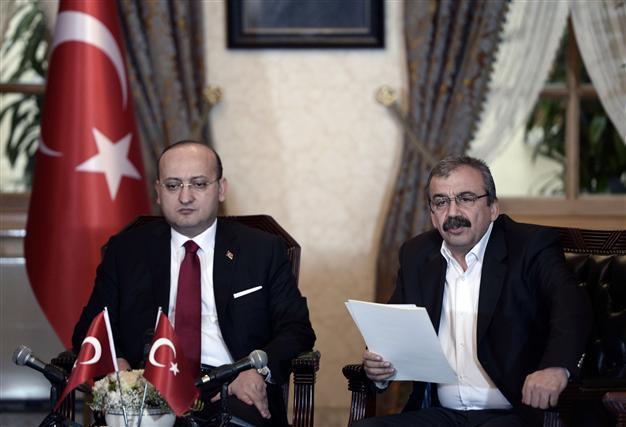Turkey's Kurdish peace bid at crossroads as actors accuse each other
ISTANBUL

This Feb 28 photo shows HDP MP Sırrı Süreyya Önder (R) speaking next to Turkish Deputy Prime Minister Yalçın Akdoğan (L) during a key meeting for the Kurdish peace process at the Dolmabahçe office of the prime ministry in Istanbul. AFP Photo
Turkey's delicate peace process to end the Kurdish problem has reached a turning point with actors accusing each other, after an overnight attack by Turkish warplanes on its camps in northern Iraq.
"The process that we have been continuing under titles such as the solution process or the national unity and brotherhood process is historic and strategic," Prime Minister Ahmet Davutoğlu said during a press conference on July 25.
Turkish PM also stressed that his government wants the PKK lay down its weapons and "those who abuse the peace process will never be tolerated."
By thanking only to the main opposition Republican People's Party (CHP) leader Kemal Kılıçdaroğlu for his stance against the recent escalation of violence in Turkey, Davutoğlu has made it clear that his criticism was directed against the Kurdish problem-focused Peoples' Democratic Party (HDP), which has been taking part in peace talks. "It is time [for the HDP] to decide. Will they choose weapons or democracy?" Davutoğlu asked.
"The AKP [Justice and Development Party] government, state institutions and the army have unfortunately taken steps that aborted the solution and peace process, as well as the effective ceasefire," the HDP said in a written statement after Davutoğlu's speech.
"A plan to win back a single party majority again by creating a nationalist and militarist climate, making an impression of engaging in a comprehensive struggle against terrorism is a plan to burn the country," the statement added.
While slamming the AKP and President Recep Tayyip Erdoğan for "mixing the fight against the Kurdish people with the fight against ISIL [Islamic State of Iraq and the Levant]," the HDP also call for dialogue.
"We have no problem that we cannot solve through talks and negotiations," it said.
PKK militants resume kidnappingsOn July 25, the Turkish military carried out fresh airstrikes and shelling against targets controlled by ISIL jihadists in Syria and embarked on a new air campaign to bombard camps of the PKK militants in northern Iraq.
Hours before Davutoğlu's and the HDP's statements, the outlawed Kurdistan Workers' Party (PKK) said its truce with Ankara had lost all meaning.
"The truce has no meaning anymore after these intense air strikes by the occupant Turkish army," the PKK said in a statement on its website.
The PKK, who until now have largely observed a ceasefire since 2013, had outraged the government by claiming the July 22 shooting dead of two Turkish police at home while they slept.
The murders, which marked an upsurge in violence in Turkey’s southeast, was followed by kidnappings and attacks by the PKK in the past couple of days.
PKK militants bombed a police headquarters in Diyarbakır late July 24, injuring 7 police officers.
On the same day, they also kidnapped a policeman on the highway between Diyarbakır and Bingöl, as well as three health officers in Erzurum. The policeman and three health officers were later released.
The PKK also raided a construction site in Şırnak on July 25, destroying the vehicles and briefly taking 15 workers as hostage.
Before the Turkish govenrment launched the now-stalled peace bid, the PKK had routinely kidnapped Turkish civil servants, workers and soldiers in the country’s southeast.
